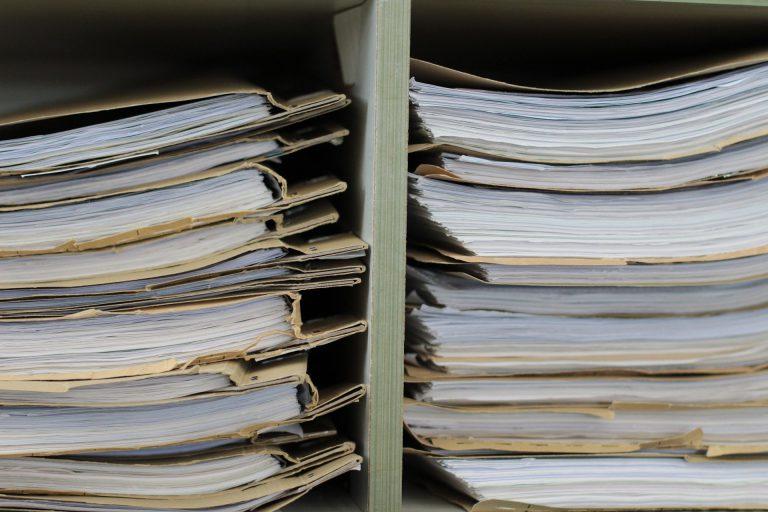If your idea of file retention is stuffing manila folders in banker boxes that you move from your office to your basement to a storage shed and eventually to the city dump – please keep reading.
File retention begins by knowing how long to keep files after they’ve been closed. The ABA suggests five years. Your state ethics rules may require a different minimum retention period (typically five to seven years). Some files should be kept indefinitely.
Once you’ve identified the applicable period, you should develop a File Retention Policy. An effective policy addresses different types of cases, as well as details like file pruning and recycling.
And disposing of closed case files doesn’t mean simply shredding them or tossing them in the dumpster. When you discard files, you’re ethically obligated to take preventive measures to avoid inadvertent disclosure of confidential information.
One key aspect of maintaining client files is keeping them safe and secure. Stay a step ahead of the criminals by attending our FREE, one-hour CLE webinar “Putting Cyber Security to Work in Your Practice” on September 17. Attorney Kevin O’Hagan – a nationally-recognized expert on cyber liability who defends lawyers and firms in malpractice cases – will give you a roadmap for staying safe and successful in these uncertain times. Register here.
9 Pro Tips for File Retention
- Research the Rules of Professional Conduct. ABA Model Rule 1.15(a) says lawyers shall maintain records of client funds and other property for five years after representation ends. What is the rule in your state? Attach a copy of the rule to your File Retention Policy. Remember: these are minimum periods. Some files should be kept longer. Regardless, retain all files at least until the statute of limitations for legal malpractice has run – plus two additional years to be safe.
- Retain some files longer than required. Matters involving minors or incapacitated parties may need an extended retention period. The same goes for real estate and business files. Tax and financial records should be kept according to Internal Revenue Service standards. Other files – because of client requests or special requirements – should also be kept longer.
- Go paperless. Scan paper documents to create electronic copies. It will ease the storage burden and save time and money.
- Identify the destruction date. Write the date on the physical file. Enter it into your case management system. Organize closed files. Tell clients how long their files will be retained.
- Give clients a copy of the file if requested. If a client requests their file and is legally entitled to it, provide a copy. Check your state rules on charging them for copying. Retain your original file until the statute of limitations has run plus two years. If the client asks for their file and you still have it although the retention period has passed, turn it over. Don’t destroy it. Lawyers have gotten into trouble for doing so.
- Be careful with electronic data. Consult an IT professional about disposing of information on hard drives and case management software. Some systems can be pre-programmed with a specific purge date. What about data stored in the cloud? Make sure you understand how digital data is retained, managed and deleted.
- Shred paper files. Consider using a vendor that specializes in document destruction. Do they understand the confidential rules unique to legal records? Does your state have a policy on recycling case material? Do your research before putting files in the recycling bin.
- Have a written File Retention Policy. Some points it should cover: how the retention period is calculated; how files are moved from active to closed status; who is in charge of file disposition; where closed files are stored, and in what format; guidelines for which files should be kept longer than the minimum period; master list of closed files in storage; periodic review of stored files to confirm destruction date; list of documents that should never be destroyed (original wills, vital records, etc.); how clients are to be contacted regarding closed files; how files will be disposed of, including vendor name and contact information; documentation on the disposition and destruction of files.
- Prune closed files of reusable work product. No need to reinvent the wheel for every new matter. Remove pleadings, briefs or memoranda that might be useful later. Letters can be repurposed as templates. Real estate title examination reports can be reused in future refinancings or conveyances.
Do you have a File Retention and Destruction Policy? If not, give Alta Pro a call. We can get you started in the right direction.
Alta Pro Insurance Services can help keep your practice strong and viable during these uncertain times. When you have professional liability coverage with Alta Pro, you’re automatically enrolled in the Alta Pro Lawyers RPG, which gives you access to a broad range of benefits, including the Pro Practice Playbook, Ask the Risk Pro, Reminger ProLink, discounts on Clio cloud software and much more. Here’s how to join.

















